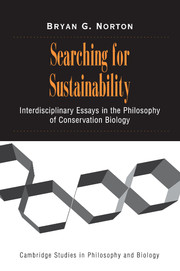Book contents
- Frontmatter
- Contents
- Searching for Sustainability
- General Introduction: An Interdisciplinary Experiment
- I PRAGMATISM AS AN ENVIRONMENTAL PHILOSOPHY
- II SCIENCE, POLICY, AND POLICY SCIENCE
- III ECONOMICS AND ENVIRONMENTAL SUSTAINABILITY
- IV SCALING SUSTAINABILITY: ECOLOGY AS IF HUMANS MATTERED
- V SOME ELEMENTS OF A PHILOSOPHY OF SUSTAINABLE LIVING
- VI VALUING SUSTAINABILITY: TOWARD A MORE COMPREHENSIVE APPROACH TO ENVIRONMENTAL EVALUATION
- Index
General Introduction: An Interdisciplinary Experiment
Published online by Cambridge University Press: 21 January 2010
- Frontmatter
- Contents
- Searching for Sustainability
- General Introduction: An Interdisciplinary Experiment
- I PRAGMATISM AS AN ENVIRONMENTAL PHILOSOPHY
- II SCIENCE, POLICY, AND POLICY SCIENCE
- III ECONOMICS AND ENVIRONMENTAL SUSTAINABILITY
- IV SCALING SUSTAINABILITY: ECOLOGY AS IF HUMANS MATTERED
- V SOME ELEMENTS OF A PHILOSOPHY OF SUSTAINABLE LIVING
- VI VALUING SUSTAINABILITY: TOWARD A MORE COMPREHENSIVE APPROACH TO ENVIRONMENTAL EVALUATION
- Index
Summary
In the late 1980s, I was in the process of finishing a book in which I had argued – to my satisfaction, at least – that environmental philosophers should adopt a new role in the process of environmental policy development, that they should reduce their appeal to abstractions and arguments regarding universal principles, and become more pluralistic and problem-oriented. My goal was to encourage philosophers to contribute to the larger policy process from within democratic decision procedures and to venture out of the insulated atmosphere of academic departments of philosophy. While I doubt that I deserve much credit for the trend, I am happy to say that a number of very bright and talented young philosophers have begun to work in a more problem-based and process-oriented mode, and today I believe environmental ethics stands at the threshold of a new era, an era in which “environmental ethics,” defined narrowly as the search for justifications of general moral principles such as biocentrism or ecocentrism, will give way to a new era of “environmental philosophy,” and I predict that there will be an efflorescence of new ideas and practical suggestions for responding – rationally and democratically – to specific, place-based environmental problems.
During this same time, I undertook a sort of intellectual experiment on my own, an experiment that resulted in the writing of a series of papers, some of which are collected here.
- Type
- Chapter
- Information
- Searching for SustainabilityInterdisciplinary Essays in the Philosophy of Conservation Biology, pp. 1 - 8Publisher: Cambridge University PressPrint publication year: 2002



